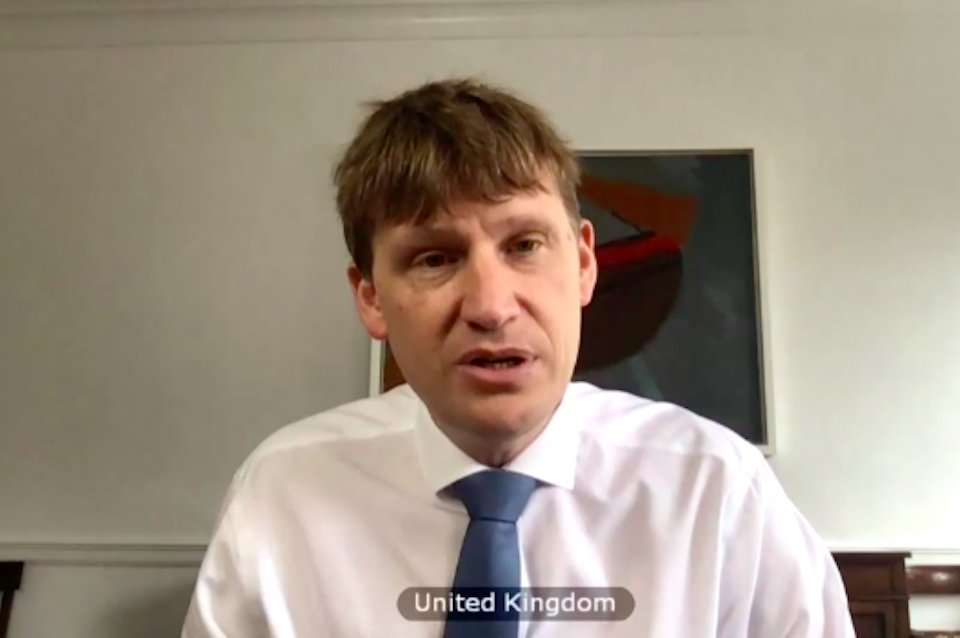Finding solutions to global displacement
Statement by Ambassador Jonathan Allen, UK Charge d' Affaires to the UN, at the Security Council briefing by the UN High Commissioner for Refugees

Thank you, Mr. President and thank you also High Commissioner Grandi. I’m sorry I missed your remarks, but I was carrying out my democratic duty to elect new members of this Council. Thank you also for the tremendous efforts that you and UNHCR are making across the globe to help those most in need, particularly in light of the huge impacts of COVID-19.
The United Kingdom is a strong and steadfast supporter of UNHCR and last year we contributed $122 million dollars in core and country level funding. And I want to echo the concerns expressed today about COVID-19’s impact on refugees and internally displaced persons. We’ve provided $184 million dollars for the new UN appeals, including $25 million dollars for UNHCR as part of an overall $1 billion dollars for the COVID response since the crisis began. And that money for UNHCR and for the UN appeals will help install handwashing stations and isolation and treatment centers in refugee camps, provide protection and education services to forcibly displaced children, and increase access to clean water for displaced people in areas of armed conflict. As the High Commissioner set out, efforts to build and sustain peace are the key to resolving displacement. The COVID-19 crisis is therefore an opportunity, colleagues, for us to redouble our conflict prevention and our peace-building efforts in support of the Secretary-General’s vision of Building Back Better. And we agree that a continued focus on solutions remains critical. We have consistently emphasised the importance of longer-term developmental measures, which increase refugee self-reliance as well as the importance of access to key services and opportunities, including education, work and training, delivered in a way which also looks to support generous host communities and countries. And in that respect I want to commend Jordan’s recent announcement that they will allow all registered refugees, regardless of nationality, access to subsidised public health care in their continued support provided to refugees across all sectors. Indeed, we commend the generosity of all countries in the region who have hosted Syrian refugees for so long.
The entrenched conflict in Syria and the failure to reach a political solution or even a lasting, nationwide ceasefire continues to prevent large scale returns. And whilst we hope that Syrians will ultimately be able to return home, we agree with the United Nations judgment that conditions in Syria do not currently allow for this. We continue to look to UNHCR to uphold the principles and the thresholds which should be met before facilitating returns and we agree with the High Commissioner regarding the importance of measures to avert the ongoing acceleration of forced displacement. In north-west Syria, where over one million civilians were displaced as a consequence of the most recent conflict, preserving the ongoing ceasefire and extending the mandate of the UN cross-border aid mechanism are our priorities for averting further displacement.
In Myanmar, the recent escalation of violence in Rakhine and Chin has led to significant new displacement. This uptick in violence risks setting back efforts aimed at creating conditions conducive to the safe, voluntary and dignified repatriation of Rohingya refugees. We welcomed Myanmar’s recent announcement that the MOU with UNDP and UNHCR has been extended until June 2021. However, more progress is required on creating conditions to allow for Rohingya repatriation. This remains important and urgent, given the increasing desperation in the camps in Cox’s Bazaar, the threat posed by COVID and the perilous boat journeys that refugees continue to risk in the Bay of Bengal, facilitated by ruthless traffickers, for which a recent regional solution is essential. And we have urged the governments of Myanmar to set up a transparent and credible long term plan to advance these priorities. We hope they will use their report to the International Court of Justice to do this, that they will publish it as part of the commitment to transparency. And let me also just pay tribute, and again thank, the Government and people of Bangladesh for their incredible generosity in supporting so many refugees on their territory.
Finally, Mr President, let me say that the United Kingdom remains committed to doing its part to meet the needs of the some 50 million internally displaced persons across the globe, 90 % of whom are displaced as a result of conflict and violence. We are a long standing advocate and supporter of the Secretary-General’s High-Level Panel on Internal Displacement, which we believe represents a critical opportunity to galvanise political attention, to tackle the growing challenge of internal displacement and find solutions that all countries can take forward. I thank you, Mr. President.